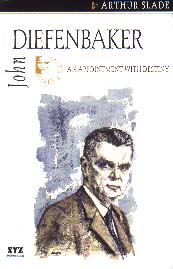| ________________ CM . . . .
Volume VIII Number 4 . . . . October 19, 2001
excerpt:
John Diefenbaker is an addition to the excellent Canadian biography series published under the auspices of the "Quest Library." In presenting the life story of John Diefenbaker, Canada's thirteenth Prime Minister, the book shares the general characteristics of the series: it is written in an engaging novel-like format, employing descriptive prose, dialogue, and the myriad details of everyday life. The author is adept at writing for the projected audience of young adults, and the level of the series ensures that it will be of interest to adult readers generally. The book introduces the reader not just to the life story of the principal character. Through that character, the reader is shown a particular dimension of Canadian life - in this case, politics at the provincial, federal, and international levels; and this dimension is, in its turn, set against the broader background of national and world events. As in all the books of the series, this latter process is aided by a very useful time-chart which sets the events of the subject's life against parallel events in Canada and the world. Interest is further enhanced by a well-chosen array of black-and- white photographs. Because we have come to think of Diefenbaker primarily in his role as a national leader of the Progressive Conservative Party, the book performs a useful service in showing how his political education was, in fact, shaped at the provincial and municipal levels. (Diefenbaker lost five elections in succession and was reputedly ready to abandon the field just at the point final victory came.) This coming of age may have been something of a trial for Diefenbaker, but, for the reader, it provides some intriguing insights into the character of local and provincial politics during a more rough and ready stage of the nation's development. Diefenbaker is among the relatively small group of Canadian political leaders for whom ambivalence just doesn't seem to work. Like Trudeau after him, Canadians seemed either to love or to hate "Dief," often for the same reasons. In part, this was a result of what he represented (Western and Northern alienation, suspicion of multiculturalism, etc.); and, in part, it was a reaction to the person himself or at least the projected persona. The author does a reasonable job of the first, showing how Diefenbaker was bringing to the national scene an agenda that was not always greeted with joy by the establishment, including that within his own party. The second element Diefenbaker the man is much less effectively handled. An effort is made to explain the origin of various of his attitudes and values (the influence of his parents and two wives, of his experience in the North and West, and his work as a criminal lawyer); but, because the author clearly falls into the "love" camp, little mention is made of the serious criticisms leveled at him inside and outside the party: weak administrative skills; suspiciousness bordering on paranoia; self-confidence bordering on megalomania. These charges may or may not have been fair, but they are important elements in explaining the internal party unrest that finally drove him from power. In treating Diefenbaker as a rather ordinary, but frequently misunderstood, individual and by treating his opponents as impatient and self-serving, the author seems to ignore the complexity of the man and of his relationships a complexity that is such a critical element in understanding his rise to power and his fall from grace. We are left, therefore, with good overviews of the principal events of the "Diefenbaker Years" (the Cold War, the Avro Arrow, Bomarc missile and the issue of nuclear warheads, the Munsinger affair, the disastrous personal relationship between Diefenbaker and Kennedy, the Cuban Crisis, the Hall Commission, etc., many of these defining moments for Canada and for the world); but we are left at the same time with relatively little understanding of the man, himself, or of the characteristics that help explain many of those events. Although the discussion of the Diefenbaker phenomenon is still a sensitive one, a more penetrating assessment of the man and his mythology would have been valuable. Often people like Diefenbaker come to embody the attitudes and perspectives of a significant segment of the population, and, in his case, these arguably included the "alienated" and westerners suspicious of multiculturalism and bilingualism. To understand the career of the protagonists, we have to understand those larger social forces that find their centre and expression in them. Through those protagonists, we should, therefore, be able to get a better understanding of the worldview of their constituents an important part of coming to an understanding of the country as a whole. With Trudeau, Diefenbaker is perhaps one of Canada' s most significant such "lightening rods"and an invaluable conduit into the Canadian psyche. Unfortunately, the opportunity to examine him in that light was avoided and lost. In summary, then, John Diefenbaker gives us a useful overview of an important period in Canadian history and some engaging insights into the Canadian political process. Unfortunately, we will have to wait for a fuller portrayal of Diefenbaker, the man and myth, and an analysis of the ways both reflected and influenced the country. Recommended. Alexander D. Gregor is a member of the Centre for Higher Education Research and Development at the University of Manitoba.
To comment on this
title or this review, send mail to cm@umanitoba.ca.
Copyright © the Manitoba Library Association. Reproduction for personal
use is permitted only if this copyright notice is maintained. Any other
reproduction is prohibited without permission.
Published by NEXT REVIEW | TABLE OF CONTENTS FOR THIS ISSUE - October 19,
2001.
AUTHORS | TITLES | MEDIA REVIEWS | PROFILES | BACK ISSUES | SEARCH | CMARCHIVE
| HOME
|
